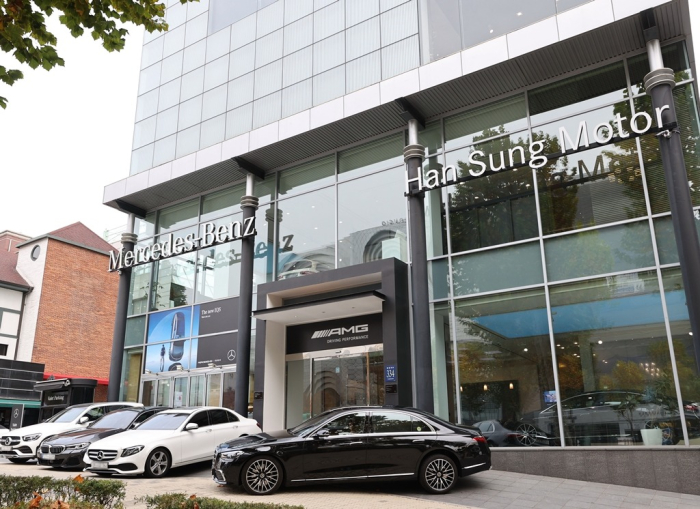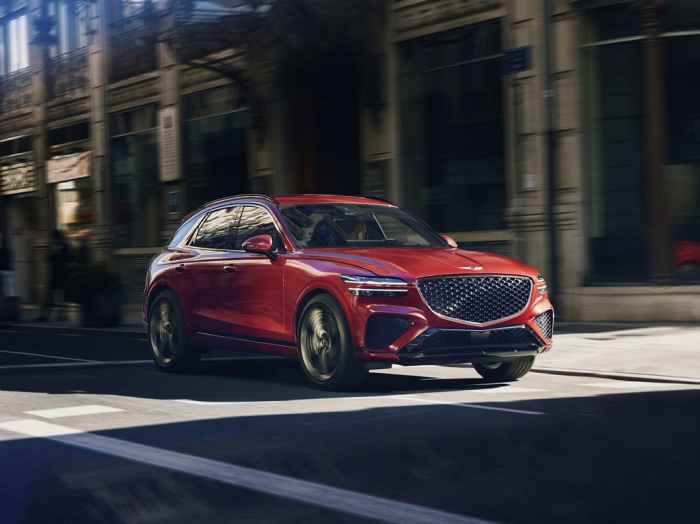Automobiles
Imported cars set to snap 3-year growth streak in S.Korea
The Hyundai Genesis, rising interest rates, upcoming license plate regulation are expected to hurt sales of foreign brands
By Nov 08, 2023 (Gmt+09:00)
2
Min read
Most Read
LG Chem to sell water filter business to Glenwood PE for $692 million


KT&G eyes overseas M&A after rejecting activist fund's offer


Kyobo Life poised to buy Japan’s SBI Group-owned savings bank


StockX in merger talks with Naver’s online reseller Kream


Meritz backs half of ex-manager’s $210 mn hedge fund



Imported passenger cars are expected to see their first retreat in four years in South Korea on the growing popularity of domestic luxury models such as Hyundai Motor Co.'s premium Genesis line and weaker purchasing power brought on by slowing economic growth and rising interest rates.
Foreign automakers such as Tesla Inc., Mercedes-Benz and BMW accounted for 18% of Korea's passenger car market in the first 10 months of 2023, taking up 226,602 out of a total of 1.3 million luxury vehicles, according to the Korea Automobile Importers & Distributors Association and Seoul-based auto market data provider Carisyou on Wednesday.
The market share of overseas brands is unlikely to top the record-high 20.1% reported last year, given that local automakers have been aggressive about introducing premium models to attract more customers looking for luxury cars, industry sources said.
“The quality and services of local automakers such as Hyundai and Kia Corp. improved, reducing customers' desire for foreign-made cars,” said Lee Ho-geun, an automotive engineering professor at Daeduk University. “The Genesis in particular, is absorbing demand for imports, although high-end foreign brands such as Mercedes-Benz and BMW are unlikely to suffer much from lower sales.”

Overseas carmakers have been expanding their presence in Korea since the 2010s by whetting drivers' appetite for premium models. Their market share has nearly doubled over a decade, from 10.1% in 2012. Their share leaped from 16% in 2019 and 16.7% in 2020 to 19.2% in 2021.
GREEN LICENSE PLATES
Sales of imported cars in Korea may come under pressure if the country introduces green license plates for vehicles purchased for corporate use selling for more than 80 million won ($61,468) starting next year, industry sources said.
The government plans to implement the measure in January 2024 to prevent luxury car owners from exploiting corporate tax benefits and cost reductions by registering their personal-use vehicles in the name of a corporate entity.
The measure is set to take effect as sales of lower-end imported cars have been falling on the back of higher interest rates.
“Demand for low-cost foreign models is already weakening due to higher borrowing costs and sluggish economic growth,” said Kim Pil-soo, an automotive engineering professor at Daelim University. “The regulation on license plates for corporate vehicles is also likely to affect the imported car market.”
Write to Nan-Se Bin at binthere@hankyung.com
Jongwoo Cheon edited this article.
More to Read
-
 Central bankBOK chief says inflation may ease more slowly than expected
Central bankBOK chief says inflation may ease more slowly than expectedOct 19, 2023 (Gmt+09:00)
2 Min read -
 AutomobilesBMW premieres new 5 Series in Korea, the model’s top market
AutomobilesBMW premieres new 5 Series in Korea, the model’s top marketOct 05, 2023 (Gmt+09:00)
2 Min read -
 AutomobilesHyundai Motor’s Genesis: Distilled luxury with 1 million car sales
AutomobilesHyundai Motor’s Genesis: Distilled luxury with 1 million car salesSep 17, 2023 (Gmt+09:00)
3 Min read
Comment 0
LOG IN


